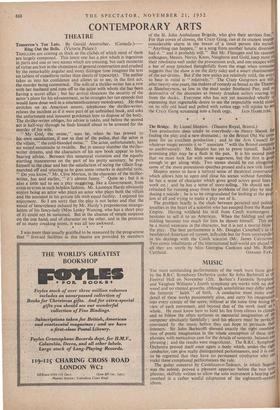The Bridge. By. Lionel Shapiro. (Theatre Royal, Bristol.) THIS production
does credit to everybody—to Henry Sherek for finding the play and a new dramatist ; to the Bristol Old Vic coin- pony for an excellent production ; and to the Arts Council for whatever magic permits it to " associate " with the Bristol companY so unobtrusively. Mr. Shapiro has yet to prove himself. Such a promising play may be a flash in the pan. It is his second piece that we must look for with some eagerness, but the first is good enough to get along with. Two scenes should be cut altogether, some of the more pretentious speeches pruned and a new title found Shapiro seems to have a natural sense of theatrical constructiao which allows him to open and close his scenes without fumbling; he has a sense of character which gives good actors good lines a work on ; and he has a sense of story-telling. He should not Eg criticised for running away from the problems of this play by irate ducing a suicide ; he is to be congratulated for looking at the pair lem at all and trying to make a play out of it. The problem briefly is the clash between personal and politid loyalties in the heart of a scientist who has escaped from the RussigP Empire. Having withheld his skill from Czech warmongers Y hesitates to sell it to an American. When the bidding and ovd' bidding becomes too much for him he shoots himself. This ni0 be a moral weakness in the character, but it is not a mortal blow ,r the play. The best performance is Mr. Douglas Campbell's as If bewildered American oil tycoon, inflexible but far from unscrupulc0 in his dealings with the Czech scientist (Mr. James Cairncro54 Two comic inhabitants of the international half-world are playedul all they are worth by Miss Georgina Cookson and Mr. Robd










































































 Previous page
Previous page